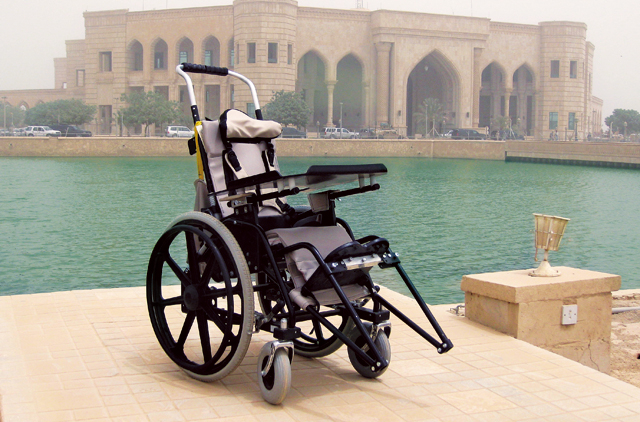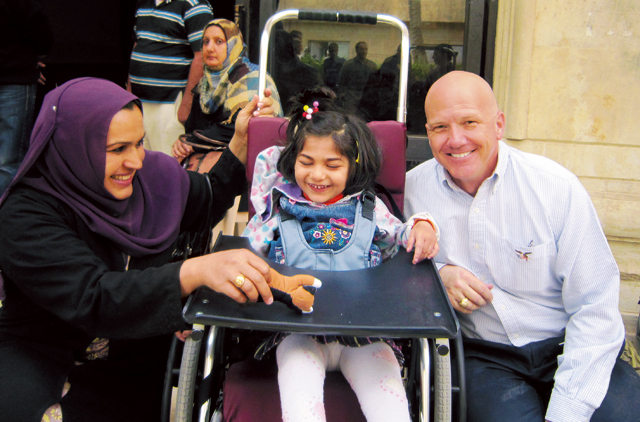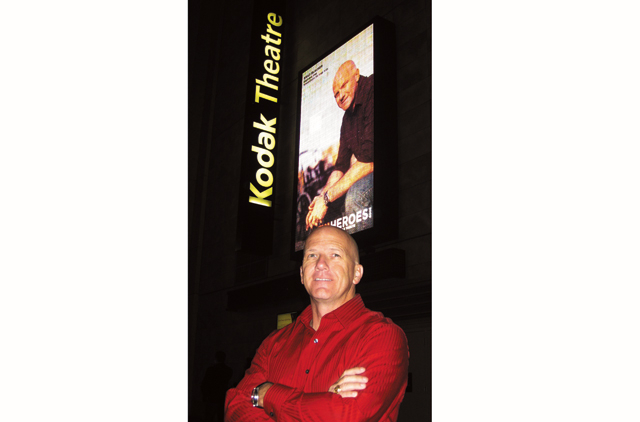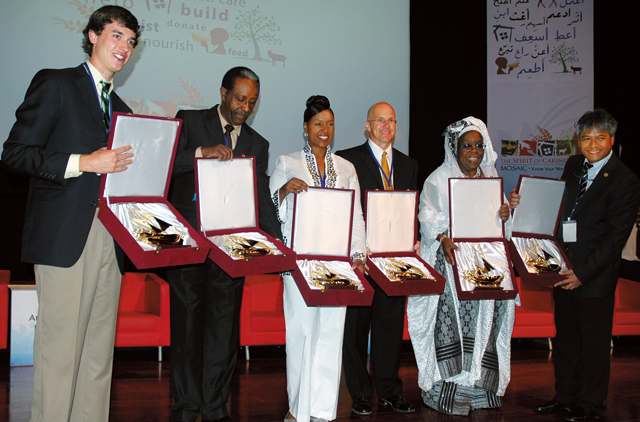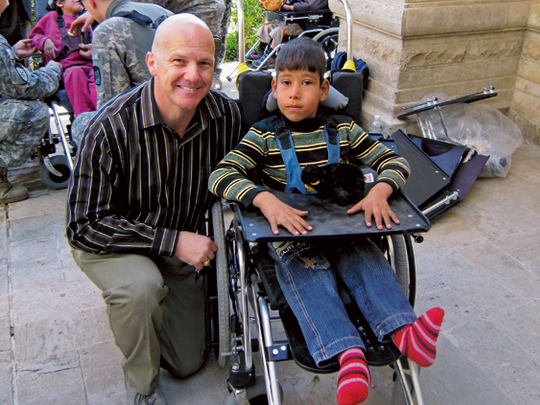
The year was 2004 and Brad Blauser, a civilian contractor from Texas, US, had just been posted to Baghdad, Iraq. Armed with two business degrees (one in management and the other in marketing) from Texas A&M University, Blauser was busy with his job, which involved travelling to different parts of Baghdad.
But in the summer of 2005, a chance meeting with a US Army doctor, Dr David Brown, changed Blauser's life and those of his associates in ways he never imagined.
Brown was treating children with disabilities in Mosul, a city in northern Iraq, and Blauser learnt that the ones most affected in war-torn Iraq were children.
"I noticed that many children came to Dr Brown with physical challenges, and he couldn't help all of them. Some had birth defects such as cerebral palsy, spina bifida and crippling effects of childhood illnesses such as polio. Even worse, many had been injured in the war and had limbs missing requiring surgery," says Blauser in an email interview with Friday.
Blauser told Dr Brown that he wanted to volunteer his time to help make the lives of the children better. The medical practitioner welcomed his initiative. "If you can help find good quality paediatric wheelchairs - a first step in basic health care for treating children with walking disabilities - that would be really helpful," he told Blauser.
Once he knew what was required, Blauser did not pause. "I asked my friends and family in the US for help and within a month had 31 paediatric wheelchairs on the ground in Mosul,'' he recalls.
"It was then that I realised people from outside Iraq wanted to help in some way, and if I provided them an avenue for helping Iraqi children receive high-quality paediatric wheelchairs, they would gladly get involved.
"Children who cannot walk are the ones who need help the most. When the scary times come - bombs explode, guns erupt sending bullets through the streets - kids who have [lower limb] disabilities cannot [escape]."
A moving moment
Seeing the smiles on the faces of the children who benefited from the wheelchairs was a moving moment for Blauser. He recalls the moment when Yousuf an eight-year-old boy with cerebral palsy received a wheelchair.
Yousuf's twin brother could attend school, but he could not because of the condition he was born with. He used to look longingly at children playing ball in the streets or going to school and wish he could be mobile like them.
Then in April 2011, Yousuf's mother heard about an opportunity to get a free wheelchair with a built-in desktop. Keen to get one for her son, she brought him to the centre in Baghdad where Blauser was distributing the wheelchairs. "Yousuf was overjoyed to receive his wheelchair,'' says Blauser. "Now he can attend school, which is just a few streets away from his house, with his brother. Yousuf rides in his wheelchair while his brother rides his bicycle and together they attend school hoping to live better lives.''
As the initiative gained momentum, Blauser decided to make a more formal arrangement to distribute wheelchairs. He set up a non-profit organisation called Wheelchairs for Iraqi Kids. He also partnered with a US-based non-profit group called Reach Out and Care Wheels. They agreed to sell him high-quality paediatric wheelchairs at a manufacturing price of about $300 (about Dh1,100).
The chairs are made by prisoners at the South Dakota State Penitentiary and are delivered in Iraq by the US military. To date more than 250 Iraqi families have received the wheelchairs.
Blauser's initiative had a curious spin-off. A friend who wanted to help see Wheelchairs for Iraqi Kids get some recognition for all the children helped by the cause nominated Blauser for CNN Hero of the Year Award in 2009.
"My main incentive for going along with this was to get the $100,000 cash prize to buy more wheelchairs for the Iraqi children who needed them," says Blauser.
CNN sent a team out to one of the distribution points in East Baghdad's Rusafa neighbourhood. The story aired in August 2009 on CNN International, CNN USA and CNN Spanish language channel for a week and the response was overwhelming.
"On October 1, 2009, CNN contacted me to say I was chosen to be in the top ten out of the 28 CNN Heroes. They also sent another crew from the US - including an independent film-maker from Hollywood - to document my story in detail. They invited me to the CNN Heroes Award Show in Los Angeles, California, in November 2009, where movie star and professional wrestler Dwayne "The Rock" Johnson presented my story and award on stage."
Blauser did not win the grand prize but he is content with the $25,000 that he received for being among the top ten. That's not all. "The Annenberg Foundation gave me another $10,000. So another 100 wheelchairs were sponsored by my involvement in the CNN Heroes programme!'' he says
Blauser was one of the guest speakers at the Mosaic 2010 conference in Sharjah at the Higher Colleges of Technology. "Other CNN Heroes came to share their stories of how they started ‘caring' and helping others. What a great event it was," he recollects.
The gift of mobility
Blauser has many stories to tell about children with special needs whose lives have been changed after they received the wheelchairs. Karim is one such boy. In 2008, this teenager and his father were in a Baghdad market when a car bomb detonated.
When the chaos subsided, security personnel found the boy lying on the road covered in blood. He was immediately flown in US military medical evacuation helicopter to the US Combat Hospital in the International Zone, where Iraqi and US surgeons fought to save his life.
Karim suffered severe injuries to his neck, spine and arm, and was paralysed from the chest down. His father was killed in the incident.
Karim suffers from atrophy as he cannot exercise the muscles. He may have to use the paediatric wheelchair for a long time, says Blauser.
The condition of another boy, who has cerebral palsy, remains vivid in Blauser's mind. To move around, he could only drag himself on the floor. "After we gave him his wheelchair and adjusted it to fit him properly, initially he just sat there with a blank expression on his face. I then went over, took his hands and placed them on the wheel handles and moved them back and forth. He quickly caught on, and realised he could move around by moving the wheels with his arms.
"I can still remember his face lighting up with a huge smile. He was very happy. I squatted about five metres away from him and held out my arms, encouraging him to come towards me. And he did. He propelled himself along the patio, giggling the whole time. By the time he left [the distribution centre] with his parents, he was self-reliant. He was mobile," recalls Blauser.
Blauser appears to have had an amazing effect on not just special needs children. Ben, an American boy, who at the age of ten read Blauser's story on CNN, decided to do something to help children with disabilities. A guitar player from the age of two, he made a poster with Blauser's pictures. He then put up the poster in front of a bakery near his home in San Francisco, California, where for more than three years he's been playing his guitar on Saturdays to raise money for Iraqi children who need wheelchairs. Now 13, he recently went on tour playing concerts and appearing on live TV shows. Over the years he has raised $26,900 to fund 76 wheelchairs!
Once his contract gets over, Blauser will not have access to Baghdad and other Iraqi cities. "My plan is to relocate to a city in Kurdistan, where I'm told it's safe to live in the city. From there I can run the Wheelchairs for Iraqi Kids programme.
"I've developed alliances with disability organisations that can bring their children to my location for custom fittings and receive their wheelchairs year round, without waiting for distribution events with military security. I'm also hopeful the Iraqi Ministry of Health will become interested in providing paediatric wheelchairs for Iraqi children who need them so badly. The Provincial Rehabilitation Hospital would be the perfect distribution network for this, with physical therapists and physicians who can accurately adjust these wheelchairs to fit the needs of each child. Then as the children grow, the rehab therapists could continue to adjust the wheelchairs for them until they outgrow the wheelchair and can move into an adult chair."
Moving forward
Blauser's goal is to empower Iraqis so they can become self-sufficient in meeting the paediatric wheelchair needs of children who need them. "Hopefully, they can also export this adjustable paediatric wheelchair to other countries that do not have paediatric wheelchair solutions for their children," he says.
He also encourages anyone who would like to make a difference in this filed to contact Andrew Babcock at ROC Wheels (www.rocwheels.org). "Their purpose is to help organisations around the world set up manufacturing operations to provide the Reach Out and Care paediatric wheelchairs for children with walking disabilities in their countries.''
"I love volunteering my time to help others in need. Giving to others is such a reward in itself, leaving me with a feeling of satisfaction and fulfilment knowing another person has a little more hope now that I helped them. Acts of kindness can help build a better world for everyone," he says.
Making a difference
Who: Brad Blauser
What: Set up Wheelchairs for Iraqi Kids, a non-profit initiative to distribute wheelchairs to children with special needs in Iraq
Where: Baghdad, Iraq
Inside info
For more info, visit: http://www.wheelchairsforiraqikids.com/
Andrew Babcock can be contacted at Andrew@ROCWheels.org
Zenifer Khaleel is an Abu Dhabi-based freelancer


